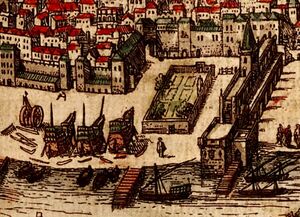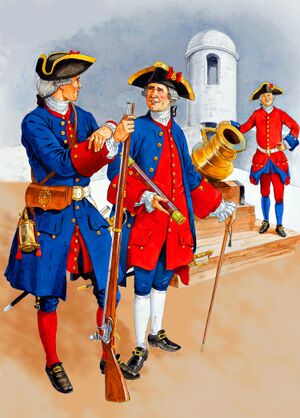Casa de Administración de Audonia y el Ultramar
 Emblem | |
| Company type | Governmental institution and company |
|---|---|
| Industry | International trade |
| Founded | 1650 |
| Defunct | 1806 |
| Headquarters | , |
The Casa de Administración de Audonia y el Ultramar de Albalitor (Also known as Casa de Audonia and later Oficina de Audonia) was an institution of the Carto-Pelaxian Commonwealth that was founded and headquartered in Albalitor in 1650. It supervised everything related to trade with the Audonia and Daxia, the Kindred Sea, Vallos and acted as a pilot school and had administrative, military and judicial functions.
Among the functions of this institution were the organization of the fleets, the supervision of the navigability conditions of the ships, the collection of trade taxes (especially those intended to finance the protection of merchant ships, known as the average). , the preparation of ship records, the granting and registration of shipping licenses, the administration of the assets of those who died in the overseas territories and the cartography of said territories.
Origins


Spices were always considered the gold of the of Polynesia and Alshar. Cinnamon, ginger, cloves, black pepper and turmeric had long been products which were difficult to obtain in Sarpedon and brought in by caravans and experienced merchants coming from the Caphiria.
A merchant of Albalitor describes the overland spice route as follows: Only the markets of Venceia then scattered these spices all over Sarpedon, great in cost, and without guaranteed arrival. In 1300s, with the establishment of the Third Empire, the trade from Vencia reduced to a great degree due to the an increase of Coscivian piracy around Sarpedon. The advantage of the Pelaxians to establish a sea route therefore virtually free of assault – however, covered in perils in the sea – showed itself rewarding and outlined a large income to the Crown in the future. Pelaxia directly linked the spice producing regions to their markets in Sarpedon.
In March 1603, Pogiano was at the head of an expedition that weighed anchor from Albalitor. Under his control were three ships: the galleon Jesús María, of 600 tons and 30 cannons, Nuestra Señora de la Visitación and Nuestra Señora de las Mercedes. The expedition was entrusted by the King Jerónimo l, to suppress the incursions of Coscivian privateers in the seas to the south of Loa Republic. Historians conjecture that they penetrated to a latitude of (64° S) in the Okatian Sea, and made port in the Freda Island. If correct, this would be the farthest south that anyone had travelled, at that time. Subsequently, several merchant vessels reported being blown south of 60° S in severe weather. Around the year 1611, Pogiano attempted to undertake an exploration of the beyond Australis, and gathered information about an almost legendary Qian's Daxia, whose kingdom was located far to the west in Alshar, and sailed to it reaching it in 1613.
On May 17, 1615, the fleet reached Daxia, thus having established the route via the Cathay Ocean and managing to open the sea route Sarpedon to Audonia. Negotiations with the local Qian State were difficult. Pogiano's efforts to obtain favorable commercial terms have been hampered by the different cultures and the low value of their gifts – in the East it was customary for kings to offer presents to the foreign envoys; in the West the kings were expected to be impressed with rich offerings. Goods presented by the Pelaxian proved insufficient to impress the Daxian and representatives mocked their offers. Pogiano's perseverance made him nevertheless initiate negotiations between him and the Qian's, who were pleased with the letters of King Eladio I. Finally, Pogiano managed to get an ambiguous letter of concession rights to trade.

Pelaxian trade with Daxia would be at first a crown monopoly. The monopoly had been managed by the Casa de Audonia, the royal trading house founded around 1650, it was the first to start a joint stock company to trade in Audonia. The Casa was responsible for the maintenance of a yearly commercial fleet and armada. However, by 1660, the Casa's finances were in dire straits and in 1670, the King of Pelaxia issued a decree opening up trade to Pelaxia to any private Pelaxian and Cartadanian national. As few took up the offer, the free trade decree was replaced in 1678 by a new system of annual monopolies, where the Casa sold Audonia trading contracts to a private Pelaxian merchant consortium, granting them a monopoly for one year. This annual contract system was abandoned in 1697, and the royal monopoly resumed.
Functions
Government powers
Temporary government: the entire administration of the Carto-Pelaxian Empire is the responsibility of the Real Casa de Administración de Audonia y el Ultramar de Albalitor, which is why it had to:
- Plan and propose to the Head of State the policies related to the overseas territories (population, relationship with the indigenous people, trade, etc.).
- Organize the ovserseas territories administratively, either with the creation of new Viceroyalties, new Governorates, etc. and establish its degree of autonomy with respect to the metropolis.
- Propose to the Head of State the names of the most suitable people for the positions of great Vallosi or Audonian authorities (Viceroys, Governors, Oidores, among others).
- Ensure the proper functioning of the authorities, issuing administrative probity measures and appointing a Residency Judge to carry out the respective Residency Trial.
- Review daily the correspondence that comes from Audonia, Vallos and other possessions, both official and public.
- Authorize the books that were sent to Audonia and Vallos
- Regulate and authorize the flow of passengers to the overseas terriories: supplies, merchants and emigrants.
- Authorize the application of Albalitoria legislation in the overseas terrirories (since 1714).
- Examine legislation originating in Vallos and Audonia, and give approval or rejection.
- Develop the rules that would govern the overseas territories and that were dictated by the Head of State as Royal Decrees or Royal Provisions (similar to the Royal Decrees but more solemn).
- Furthermore, a distinction can be made between the High Police and the Low Police, which corresponds to municipal organizations.
War powers


The President of the Casa de Audonia meets with the members of the War Council, it is the Overseas War Council (1700), where military strategies, army and militias are discussed. At the end of the 18th century and beginning of the 19th century, the "cloak and dagger ministers" (military advisors) joined this board.
Treasury and Customs Powers
The Casa de Audonia was entrusted to examine the accounts of royal officials. It also mantined the royal monopoly on copper exports where itespecially made great gains, as copper was in high demand in Daxia, to where it was exported in the form of armlets called manillas, which served as a form of money.
In 1706, about 65% of the state income was produced on overseas activity. The monopoly of trade remained profitable until 1870, and strengthened the equity and credit capacity of Pelaxia. The share of the Crown's total trade with Audonia in 1706 amounted to about 25% and increased steadily to 50% or more, but never entirely displaced the private traders: the trade monopoly was accompanied always by free trade in other products such as textiles, weapons, paper and salted fish, such as Bacalhau.
Royal monopolies were also leased out sometimes by Casa de Audonia to private traders for a certain period. After 1670, the monopolies were abolished, except for the purchase of spices and the trade in copper and silver.
Judicial powers
In matters of justice, the Council of the Kindred was the highest court in Vallos and for the purposes of administering justice the council meets in a courtroom that is made up of learned ministers. In this matter (justice), the Council was absolutely independent, even from the Head of State.
In general, the crown ensured that the council knew few matters of a judicial nature, because they were particular matters that burdened the councilors with a lot of work, which took away their time to dedicate themselves to government matters (of much more relevance). For this reason, the resources known to the council are of an extraordinary nature and of high amounts.
The function of the Chamber of Justice was:
- Know certain criminal matters (crimes committed in the Indies race, tax evasion, confiscation crimes for smuggling).
- To hear civil appeals, which the Casa would have heard when the disputed amount was greater than 40,000 pesetas.
- Hear appeals from residency trials.
- Know the Resource for second supplication.